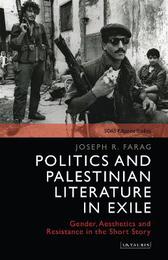
|
Politics and Palestinian Literature in Exile: Gender, Aesthetics and Resistance in the Short Story
Hardback
Main Details
Description
Despite, or even because of their tumultuous history, Palestinians are renowned for being prolific cultural producers, creating many of the Arab world's most iconic works of literature. In particular, the Palestinian short story stands out for its unique interplay between literary texts and the political and historical contexts from which they emerge. Palestinian Literature in Exile is the first English language study to explore this unique genre. Joseph Farag employs an interdisciplinary approach to examine the political function of literary texts and the manner in which cultural production responds to crucial moments in Palestinian history. Drawing from the works of Samira Azzam, Ghassan Kanafani and Ibrahim Nasrallah, Farag traces developments in the short story as they relate to the pivotal events of what the Palestinians call the Nakba ('catastrophe'), Naksa ('defeat') and First Intifada ('uprising'). In analysing several as yet un-translated works, Farag makes an original contribution to the subject of exilic identity and subjectivity in Palestinian literature. This book offers the opportunity to engage with literary works as well to learn from a literary account of history.It is a subject of interest for students and scholars of both Arabic literature and Middle East studies.
Author Biography
Joseph R. Farag is Assistant Professor of Arab Studies at the University of Minnesota. He holds a PhD from Queen Mary University of London where he served as Lecturer in Middle Eastern Literary Studies. Farag was a research fellow for Forum Transregionale Studien, affiliated with Freie Universitat Berlin. His most recent publication, 'Unacknowledged Pioneer: Gender, Nation, and Class in the Short Stories of Sam?rah ?Azz?m', appeared in Journal of Arabic Literature (Brill, 2014)."
Reviews'Fixing its creative gaze on the short story - a form with its own peculiar logic, pacing, and poise - this book is not only the history of a genre, nationally inflected, but a genre through which the three great watersheds of Palestinian history (Nahda, Nakba, and Intifada) are movingly told. In Farag's confident and well-argued study, Sartrean 'litterature engage' takes the form alternately of surrealist phantasmagoria, blunt militancy, and a searing, melancholic interiority. A surprising and informative take on the varied literary portraits of anticolonialism's true acid test.' - Timothy A. Brennan, Professor of Cultural Studies and Comparative Literature, University of Minnesota, 'In this beautifully written, textured, and thoughtful book, Farag traces the development of the Palestinian short story and highlights the significance of historical catastrophes, political commitment, and bold aesthetic innovation in the emergence and flourishing of this long-neglected genre. A must read for anyone interested in Palestinian literature and cultural production.' - Laleh Khalili, Professor of Middle East Politics, SOAS, University of London, 'Farag's excellent choice of focus on the short story, one of the most complex and yet understudied genres, further discussion of the aesthetic thrust of the form, its place within the larger literary history in Palestinian and Arabic literature, and its comparability to the force of poetic practices as the celebrated genre of resistance, is most original. Written in a flowing and engaging style, the study ultimately and forcefully fulfils its promise: the ways in which the historian and the political analyst, and their respective disciplines, can benefit from deeper study of Palestinian literary production.' - Ayman A. El-Desouky, Senior Lecturer in Modern Arabic and Comparative Literature, SOAS, University of London
|